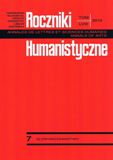Wartościowanie w dyskursie turystycznym - implikacje dla komunikacji interkulturowej
Evaluation in a Tourist Discourse Implications for Interkultural Communication
Author(s): Maria MocarzSubject(s): Language and Literature Studies
Published by: Towarzystwo Naukowe KUL & Katolicki Uniwersytet Lubelski Jana Pawła II
Keywords: positive and negative evaluation; tourist guides; interactive structure; aesthetic and cognitive values; wartościowanie pozytywne i negatywne; przewodniki turystyczne; struktura interakcyjna; wartości estetyczne i poznawcze
Summary/Abstract: Evaluation is an inherent part of the interactive structure of tourist guides. The axiological character of description in the abovementioned texts mainly consists in the occurrence of aesthetic and cognitive values, which contribute to the spectrum of cultural values. The presence of evaluative elements constitutes a tourist offer tailored to recipients’ needs. Positive evaluation is the most frequent evaluative mechanism, which is arrived at through the use of the following lexical elements: 1)adjectives (especially in the superlative); 2) nouns ; 3) verbal forms and 4) phrasems. The repetitiveness of such elements leads to the standardization of the linguistic exponents of evaluation. Textual forms of evaluation include the references to third culture phenomena and quotations. Occasionally – in order to ensure the credibility of information – there also appear instances of negative evaluation.
Journal: Roczniki Humanistyczne
- Issue Year: 58/2010
- Issue No: 07
- Page Range: 123-134
- Page Count: 12
- Language: Polish

